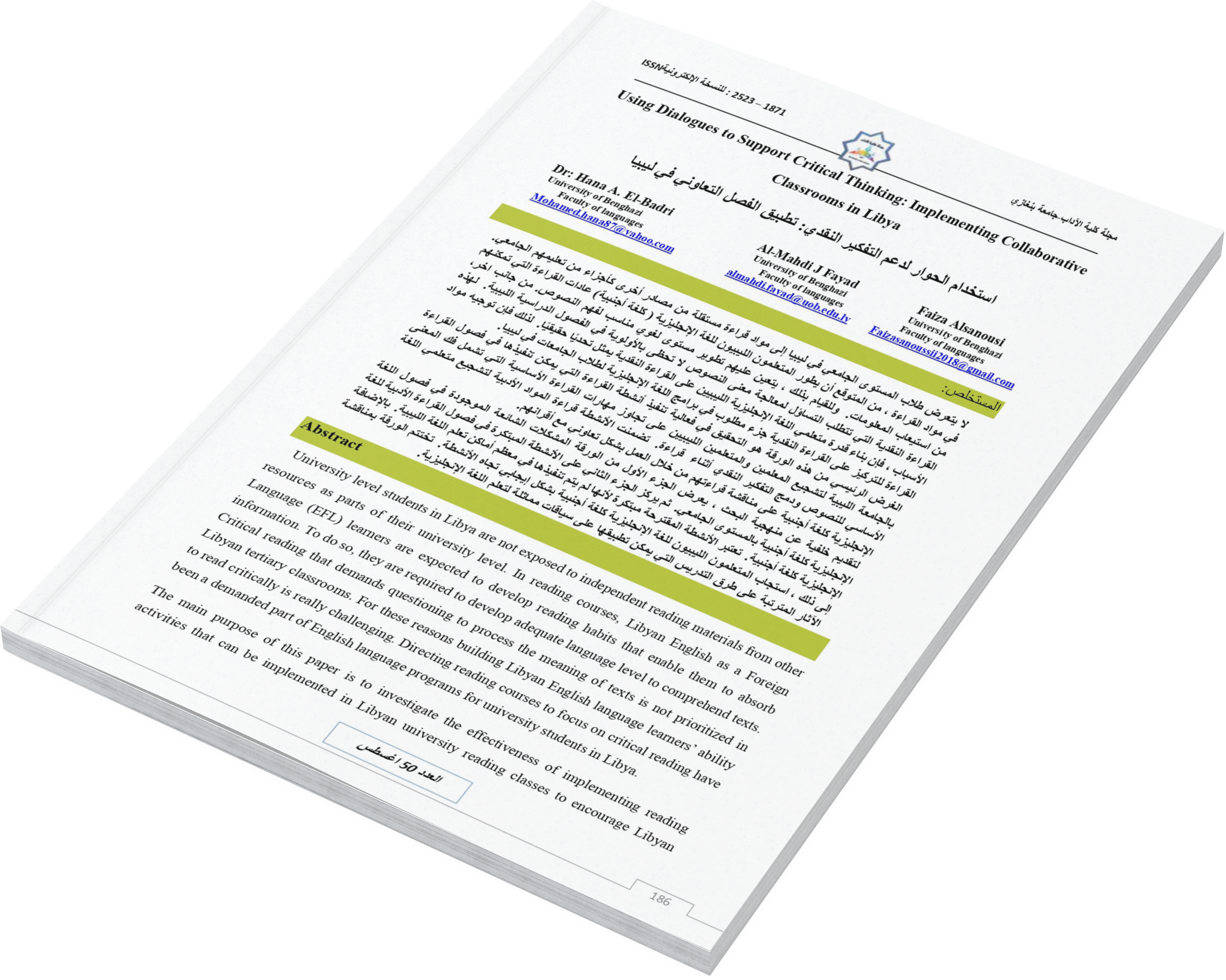Using Dialogues to Support Critical Thinking: Implementing Collaborative Classrooms in Libya
DOI:
https://doi.org/10.37376/jofoa.vi50.4463Abstract
University level students in Libya are not exposed to independent reading materials from other resources as parts of their university level. In reading courses, Libyan English as a Foreign Language (EFL) learners are expected to develop reading habits that enable them to absorb information. To do so, they are required to develop adequate language level to comprehend texts. Critical reading that demands questioning to process the meaning of texts is not prioritized in Libyan tertiary classrooms. For these reasons building Libyan English language learners’ ability to read critically is really challenging. Directing reading courses to focus on critical reading have been a demanded part of English language programs for university students in Libya.
The main purpose of this paper is to investigate the effectiveness of implementing reading activities that can be implemented in Libyan university reading classes to encourage Libyan teachers and learners to go beyond the basic reading skill that include decoding the basic meaning of texts and incorporate critical thinking while reading. The activities involved reading literary materials to encourage Libyan EFL learners to discuss their reading by working collaboratively with their peers. To provide background of the approach, the first part of the paper presents common problems found in the Libyan EFL tertiary classroom. Then the second part focuses on the innovative activities into Libyan EFL literary reading classes. The suggested activities are considered innovative because they have not been implemented in most Libyan language learning settings. Additionally, Libyan EFL learners responded positively towards the activities. The paper concludes by discussing the implications of the approach that can be applied to similar contexts of English language learning.
Downloads
References
- Abu-baker, F. (2012). Building literary competence of EFL Libyan learners in reading English literary texts. Unpublished M.A, Garyounis University, Benghazi.
- Anderson, N. J. (2008). Practical English language teaching: Reading. NY: McGraw Hill.
- Bellamy, R., & Woolsey, K. (1998). Learning conversations. ACM SIGCHI Bulletin, 30(2), 108-112.
- Carrell, P. L. (1987). Content and formal schemata in ESL reading. TESOL Quarterly, 21(3), 461-481.
- El-badri, H. (2009). Difficulties facing third year learners of English at Garyounis university in inferring the meaning of vocabulary in literary texts. Unpublished M.A, Garyounis University, Benghazi.
- El-Naili, S. (2006). Some difficulties facing third and fourth year students in learning English literary works at the university of Garyounis. Unpublished M.A, Garyounis University, Benghazi.
- Gee, J. P. (2001). Reading as situated language: A sociocognitive perspective. Journal of Adolescent & Adult Literacy, 44(8), 714-725.
- Gibbons, P. (2003). Mediating language learning: Teacher interactions with ESL students in a content-based classroom. Tesol Quarterly, 247-273.
- Lantolf, J. P. (2005). Sociocultural and second language learning research: An exegesis. In E. Hinkel (Ed.), Handbook of research in second language teaching and learning (pp. 335-354). Lawrence Erlbaum: Mahwah,NJ.
- Lindsay, C., & Knight, P. (2006). Learning and teaching English: A course for teachers. New York: Oxford University Press.
- Nassaji, H. (2002). Schema theory and Knowledge‐Based processes in second language reading comprehension: A need for alternative perspectives. Language Learning, 52(2), 439-481.
- Mohamed, H. (2017) A student-centered intercultural interactive processing model of reading English as a foreign language short fiction in Libya. Unpublished PhD, University of Aberdeen: United Kingdom.
- Mori, S. (2002). Redefining motivation to read in a foreign language. Reading in a Foreign Language, 14(2), 91–110.
- Nassaji, H. (2003). Higher–Level and Lower–Level text processing skills in advanced ESL reading comprehension. The Modern Language Journal, 87(2), 261-276.
- Nation, I. (2007). The four strands. Innovation in Language Learning and Teaching, 1(1), 2–13.
- Nation, I. (2009). How large a vocabulary is needed for reading and listening? Canadian Modern Language Review, 63(1), 59–92.
- Palincsar, A. S. (1998). Social constructivist perspectives on teaching and learning. Annual Review of Psychology, 49(1), 345.
- Pardo, L. S. (2004). What every teacher needs to know about comprehension. The Reading Teacher, 58(3), 272-280.
- Sunggingwati, D., & Nguyen, H. T. M. (2013). Teachers’ questioning in reading lessons: A case study in Indonesia. Electronic Journal of Foreign Language Teaching, 10(1), 80–95.
- Welcome, S. E., & Alton, A. C. (2015). Individual differences in the effect of orthographic/phonological conflict on rhyme and spelling decisions. PLOS ONE, 10(3), 1–17
- Widodo, H. P. (2009). Key issues in teaching EFL/ESL intensive reading: A videotaped self-observation report. The Journal of Effective Teaching, 9(3), 39–58.

Downloads
Published
How to Cite
Issue
Section
License
Copyright (c) 2023 Journal of the Faculty of Arts

This work is licensed under a Creative Commons Attribution-NonCommercial-NoDerivatives 4.0 International License.




